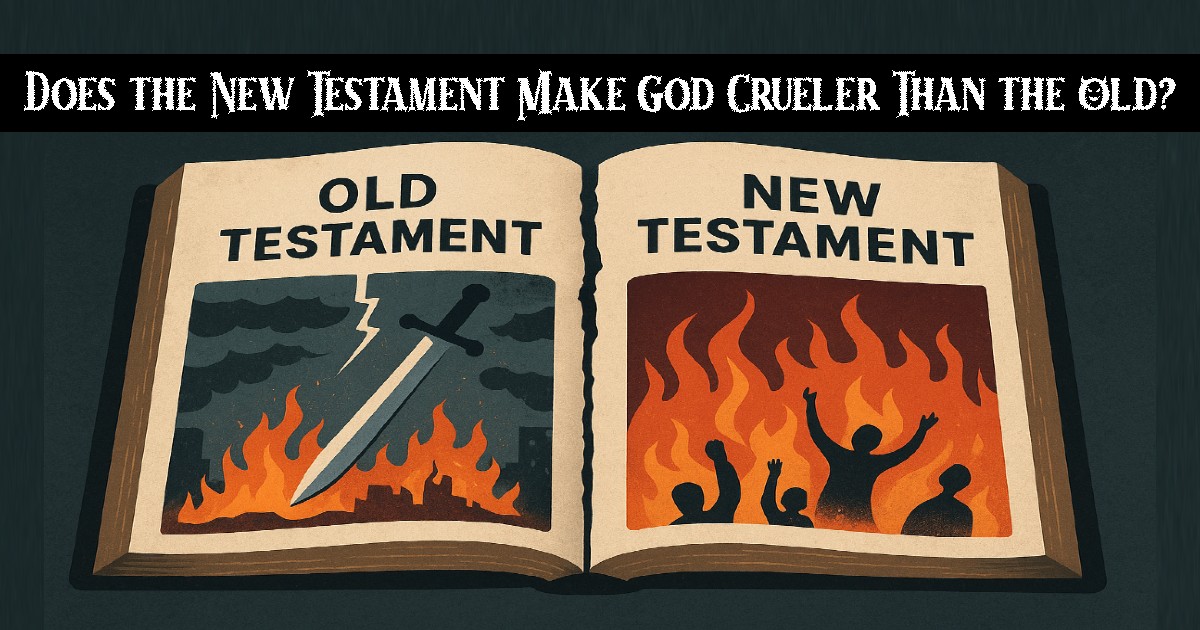For centuries, people have contrasted the “angry God” of the Old Testament with the “loving God” of the New. It’s one of the most common clichés in Christian thought: the Hebrew Bible is blood-soaked law and wrath, while the Gospels reveal a gentler Jesus of mercy and grace.
But here’s the problem: that picture is upside down. If you actually read the texts, the Old Testament may be vicious, but the New Testament takes cruelty to an entirely new level—by introducing eternal torture.
The Atrocities of the Old Testament
Let’s be honest: the Old Testament is a moral minefield. Page after page is filled with violence, blood, and divine commands that make our modern stomachs turn.
- Genocide – Whole nations wiped out at God’s command (Amalekites, Canaanites, Midianites). Men, women, children, and even livestock slaughtered.
- Slavery – God’s law not only permits it but regulates it, even allowing Israelites to buy foreigners as permanent property.
- Child Killing – Infants killed in war, Egyptian firstborn slaughtered in the plagues, Jephthah’s daughter sacrificed after a rash vow.
- Rape and Sexual Slavery – Captive women taken as war spoils, Lot offering his daughters to a mob, the Levite’s concubine raped to death.
- Barbaric Laws – Death for working on the Sabbath, stoning for blasphemy, burning for sexual transgressions.
- Cannibalism as Punishment – Prophecies where starving parents eat their own children during siege.
These are not minor moral blemishes—they’re atrocities, woven right into the sacred fabric of Scripture.
The Old Testament’s Limit: Death Ends It
Yet as brutal as all this is, there’s a boundary line. In the Old Testament, punishment ends with death. The sword, the plague, the fire, the famine—they all conclude in the grave. Sheol, the shadowy underworld, is a place of silence, not flames.
No matter how horrifying the judgment, it is finite.
The New Testament Escalation: Hell Arrives
Then comes the New Testament. This is supposed to be the “good news.” Instead, it introduces the most sadistic concept in the Bible: eternal conscious torment.
Jesus, the gentle shepherd, becomes the herald of hell:
- “Depart from me, you cursed, into the eternal fire” (Matthew 25:41).
- “Where their worm does not die, and the fire is not quenched” (Mark 9:48).
- “Weeping and gnashing of teeth” (Matthew 8:12).
- “They will be tormented day and night forever and ever” (Revelation 20:10).
For the first time in the canon, death is no longer the end of punishment. Instead, sinners are threatened with infinite agony, never ceasing, never relieved.
Infinite Cruelty vs. Finite Cruelty
Which is worse: a God who orders genocides, or a God who condemns billions to eternal torment for being born in the wrong faith, thinking the wrong thoughts, or failing to believe?
The Old Testament God kills. The New Testament God tortures forever.
The Darkest Testament
The Old Testament’s God is violent, jealous, and merciless. But at least His punishments stop when your heart stops beating. The New Testament takes the cruelty of the old and escalates it into infinity.
So let’s ask the question plainly: Does the New Testament make God crueler than the Old? The answer is disturbing: yes—infinitely so.

